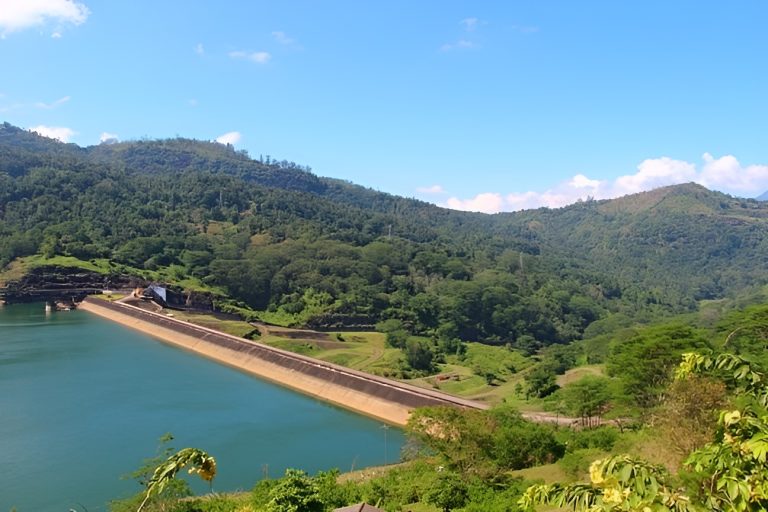Kothmale Reservoir

Kothmale Reservoir is a large and scenic reservoir located in the Central Province of Sri Lanka. Known for its serene waters and stunning landscapes, it is an attractive destination for those looking to explore natural beauty and engage in recreational activities. Here’s a comprehensive guide for beginner travelers on what to know and prepare for when visiting Kothmale Reservoir.
Kothmale Reservoir: Overview
Location and Significance:
- Location: Kothmale Reservoir is situated in the Nuwara Eliya District, near the town of Talawakele. It is part of the Kothmale Hydroelectric Project, one of the largest hydroelectric power stations in Sri Lanka.
- Significance: The reservoir was created as part of the Mahaweli Development Program and serves both as a source of hydroelectric power and irrigation for the surrounding agricultural areas. It is also a site of historical and cultural significance, with links to the ancient city of Kothmale, which was submerged during the creation of the reservoir.
Key Features:
- Scenic Views: The reservoir is surrounded by lush hills and tea plantations, offering picturesque views and a peaceful environment.
- Recreational Activities: Visitors can engage in activities such as boating, fishing, and picnicking. The calm waters and scenic surroundings make it a perfect spot for relaxation.
- Cultural and Historical Sites: Nearby areas may offer insights into the local culture and history, including temples and remnants of ancient settlements.
What to Have and Know Before Visiting
- Essential Items:
- Appropriate Clothing:
- Casual Wear: Comfortable and casual clothing suitable for outdoor activities. Light layers are recommended as the weather can vary.
- Footwear: Comfortable walking shoes or sandals, especially if planning to walk along the reservoir’s shores or explore nearby areas.
- Cash:
- Local Expenses: Carry cash in Sri Lankan Rupees (LKR) for any minor expenses such as entry fees, parking, or purchasing refreshments from local vendors.
- Identification:
- ID: Carrying a copy of your passport or ID can be useful, especially if you plan to stay in the area or visit other sites.
- Appropriate Clothing:
- Travel Essentials:
- Local Currency:
- Sri Lankan Rupee (LKR): Ensure you have enough local currency for small purchases and activities.
- Water Bottle:
- Hydration: Bring a bottle of water to stay hydrated, especially if you plan to spend a long day outdoors.
- Weather Gear:
- Sun Protection: Use sunscreen, wear a hat, and bring sunglasses to protect yourself from the sun, particularly during midday.
- Rain Gear: A light raincoat or umbrella can be helpful in case of sudden showers.
- Snacks:
- Energy Foods: Bringing your own snacks is a good idea, as options may be limited around the reservoir.
- Local Currency:
- Cultural Etiquette:
- Respectful Behavior:
- Quiet and Clean: Maintain a respectful and quiet demeanor, especially in areas where people may be fishing or relaxing.
- Photography: Photography is generally allowed, but respect any local customs and avoid disturbing the environment or others.
- Conduct:
- Respect for Nature: Avoid littering and stick to designated paths and areas to help preserve the natural beauty of the reservoir.
- Interaction with Locals: Be courteous and friendly when interacting with local residents or vendors.
- Respectful Behavior:
- Additional Tips:
- Opening Hours:
- Access: The reservoir area is generally accessible throughout the day. It’s best to visit during daylight hours to fully enjoy the scenery and activities.
- Guided Tours:
- Local Guides: Consider hiring a local guide if you want more detailed information about the reservoir’s history, the hydroelectric project, or the surrounding area. Guides can provide valuable insights and enrich your experience.
- Transportation:
- Getting There: The reservoir is accessible by road, and you can reach it by car, tuk-tuk, or local buses. Confirm transportation options and fares in advance.
- Nearby Attractions:
- Explore the Area: While visiting Kothmale Reservoir, consider exploring nearby attractions such as local temples, tea plantations, and historical sites.
- Safety:
- Personal Belongings: Keep an eye on your belongings, especially if you are near the water or in more remote areas. It’s also important to stay aware of your surroundings.
- Opening Hours:



Responses